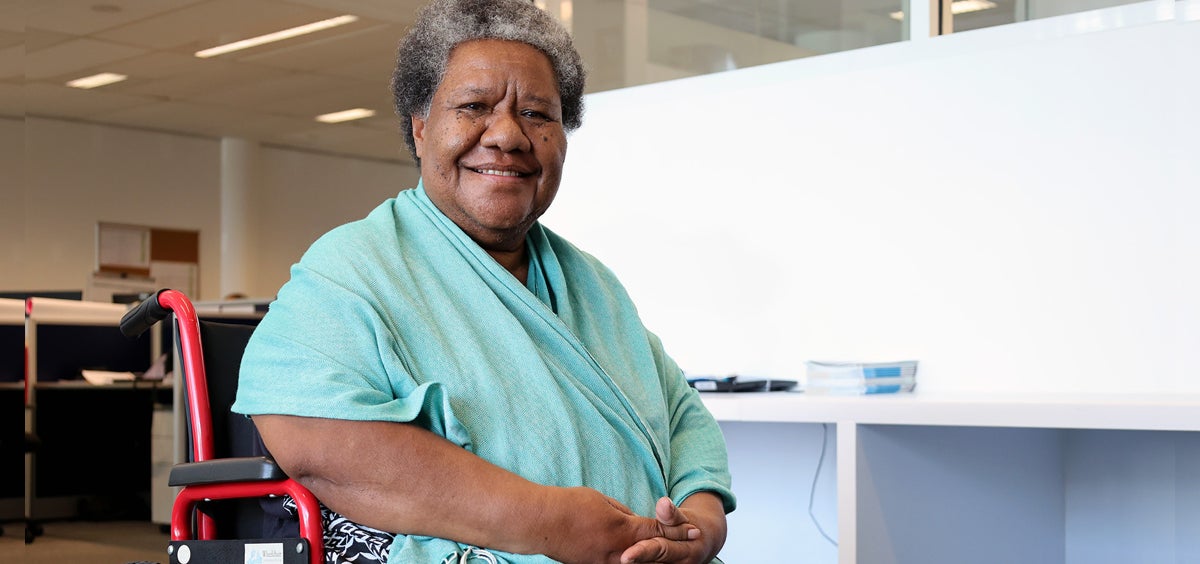Take Five Papua New Guinea: “Effective and full participation means recognizing our voices and allowing us the agency to decide for ourselves”
Date:

Ms Ipul Powaseu role as an advocate for disability began in 2006 and since then has led in advocating for the empowerment and promotion of the rights of persons with disabilities. She headed the Papua New Guinea (PNG) Assembly of Disabled Persons* for 9 years since its establishment in 2009 to 2018. She then handed the baton to emerging leaders and is taking on an advisory role. Through this leadership role, she developed a structure of people with disabilities’s organization at the sub-national level creating 20 DPOs (sub-national level) and recently established a foundation for the establishment of Women with Disability Network across the 20 provinces of PNG. Ipul has contributed to regional and global discussions on disability issues through her involvement and participations on various global committees and groups. She held positions on the Pacific Disability Forum as co-chair female and board member.
You spent close to 30 years as a renowned agricultural scientist and socio-economic researcher. What inspired you to move into disability advocacy?
I moved into this space after attending a leadership workshop for people with disabilities in 2006. Here, I heard of the discrimination and challenges women with disabilities were faced with. At this workshop, I was confronted by young women and other older women about being a voice for them. They needed a leader to be their voice.
Your work uniquely addresses the intersection between disability rights and climate change resilience. Why is it crucial to consider the needs of people with disabilities in climate change adaptation and mitigation strategies?
I hail from an island community in PNG, and my career took me out of my home island. Almost 15 years later, I returned home and saw the devastating effects of climate change on my familiar surroundings: beachfront erosion and salination of water wells due to high sea level rise. As a person with a physical disability, it was very difficult for me to even climb up the sea walls where I once could walk up the sandy banks to my house.
Planning for structural infrastructures should consider the access needs of people with disabilities, as well as their involvement for livelihood support. With adaptations, there needs to be involvement of organizations of persons with disabilities (OPDs) in considering accessible infrastructures to meet their needs as well. For instance, if building jetties for people on the island, the needs of people with disabilities must be taken into consideration. Livelihood projects, such as climate-resistant varieties in terms of food security, need to include people with disabilities as well for sustenance, as the salination has destroyed their backyard gardens.
My biggest concern is that our governments need to understand the nexus at play between climate change and the various identities that people with disabilities, especially women with disabilities, are confronted with. Being an indigenous woman with a disability involves gender, indigeneity, and disability, further marginalizing women with disabilities.
The PNG Government ratified the Convention on the Rights of Persons with Disabilities (CRPD) in 2013. What impact this move has had in inclusion and participation?
The concept of disability inclusion is still not well understood. People with disabilities are calling for a seat at the decision-making level, yet this is not being done. And only when we gatecrash do governments take note of our presence. We need to be sitting at the table rather than being invited to participate and warming the seat (tokenistic approach). The concept of disability is yet to be well understood by decision-makers as a human rights and development issue. Most policies are still focused on a medical and welfare approach, hence policies are usually about cash transfers. We need more than that. Effective and full participation means recognizing our voices and allowing us the agency to decide for ourselves.
With the 30th anniversary of the Beijing Declaration and Platform for Action approaching, how do you assess the landscape of women's rights and gender equality evolving in PNG? What are the most notable changes you have witnessed?
There is greater awareness around women’s rights and gender equality. However, we have yet to hold our government accountable. A recent research by International Women’s Development Agency (IWDA) highlights several recommendations, and one of the main recommendations is that the women’s rights movement in PNG needs to hold their government accountable for their citizens’ rights. Another area that emerges from the research is that there needs to be cross-learning from the different identities and hold hands with other women’s organizations taking the lead in leadership and economic empowerment areas that we are often left out of.
What three critical issues of gender equality would you like to highlight for urgent attention from national authorities in PNG?
For me, the three critical issues are:
- Governments’ accountability to gender issues in PNG. There is already a Parliamentary committee on Gender Equity and Women’s Empowerment (GEWE), but there needs to be funding provided for women’s rights organizations to apply for so that issues experienced on the ground in relation to GEWE can be localized and contextualized. Most GEWE interventions are funded through development and donor agencies and less from the government.
- Governance issues – strengthen the office of women and development and fund the National Council of Women to be an office of its own as it is a government-legislated women’s voice by an Act of Parliament.
- There is currently a disability bill that is yet to be tabled in Parliament, and this needs to be actioned immediately.